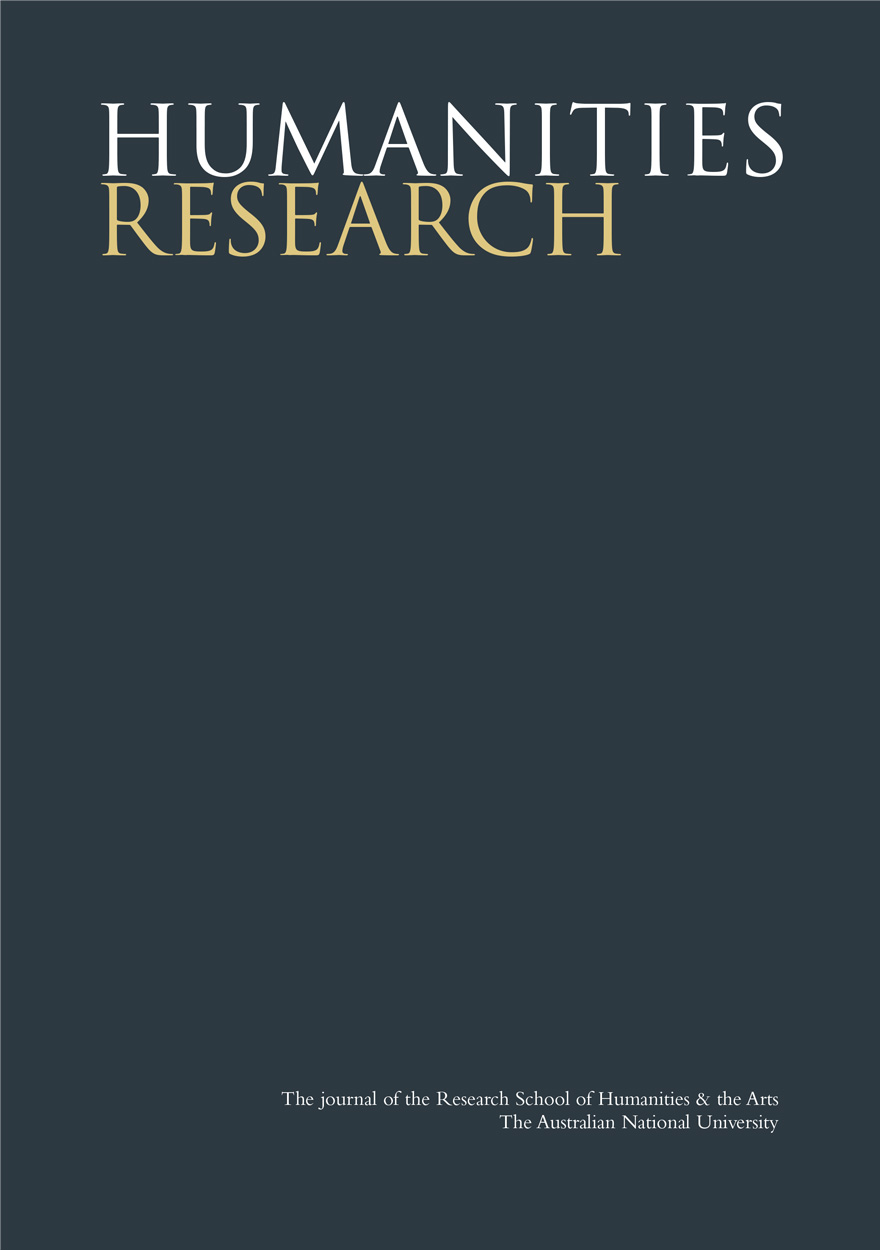Humanities Research
Aims
Humanities Research responds to the need for the humanities to play a prominent role in public and academic discourse, which has never been more evident or necessary. The journal promotes research, analysis and debates about the lessons of the past and engagement with the issues that confront humanities scholars and thinkers, citizens of the world at individual and population levels, and members of national and local communities, now and into the future. It publishes major international, regional, theoretical, methodological and topical case studies, themes and debates. It encourages comparison of theories, practices and developments in different global settings. The journal particularly encourages submissions that engage with matters of public culture, the value of critical thinking, collaborative and multidisciplinary research in universities as well as political and social contexts, and ethical leadership in all fields of humanity.
Scope
Humanities Research interprets the ‘humanities’ generously, recognising and encouraging the continued practice of new methods of theoretical and empirical enquiry to break down traditional distinctions between the humanities and the social sciences, creative arts and ‘non-traditional’ research practices, natural and technological sciences.
The journal welcomes contributions from social researchers, artists, curators, writers, theorists and policymakers working across fields including but not limited to anthropology, archaeology, literature, history, art, design, film, philosophy and intellectual history, music, languages, linguistics, environmental and medical humanities, political science and international relations, Indigenous studies, art, culture, museums, digital culture and heritage. It publishes original research, creative work and debates and critical discourse on traditional, contemporary and popular issues in arts and issues in the field of humanities and cognate studies. Contributions can be in the form of conceptual, methodological or theoretical approaches, case studies or essays, artists’ writings, critical essays, historical documentation, interviews, performance texts and book reviews. It particularly encourages discussion of public humanities projects that allow a diverse public to look critically at issues through cultural organisations, public art, heritage, oral history and material culture.
The journal is co-published by the Humanities Research Centre, The Australian National University, Canberra.
Humanities Research has a team of two editors who are responsible for the day-to-day editorial work, and an Editorial Board that provides advice and ratification of decisions made by the co-editors. The editors provide a report on the journal’s management to the Humanities Research Centre’s Advisory Board annual meeting.
The term of tenure for editors is three years, and is renewable. One editor will be the Head of the Humanities Research Centre, or their delegate.
Co-published publications are also subject to the ANU Press Publishing Ethics and Publishing Malpractice statement.
ANU Press publishes a free electronic version and a print-on-demand hard copy of the journal.
Publishing schedule
Humanities Research is published once a year. Special issues may also be published either within or outside the normal publication schedule of the journal.
Access
Fully open-access scholarly publication is made freely available immediately upon publication. Authors are required to agree with this open-access policy, which enables unrestricted access and reuse of all published papers, with appropriate acknowledgement and citation.
Users are allowed to copy and redistribute the material in printed or electronic format and build upon the material, without further permission or fees being required, provided that appropriate credit is given. The copyright page of the journal will have further information on the specific copyright conditions of particular publications.
Copyright and licensing
The Humanities Research Centre retains copyright over all published journals and the Humanities Research logo.
ANU Press retains copyright over all journal layouts and cover designs that have been created by ANU Press. Where ANU Press has not created this content, this is indicated on the copyright page of the publication. ANU Press also retains copyright of all ANU Press logos and the ANU Press webpages.
Authors retain copyright over their papers, unless otherwise agreed or stated.
Creators of visual and other materials retain copyright over these materials, including photographs, maps, artworks, graphics, video, audio or any other material that might be included in an online publication.
Permission must be obtained to reuse any content that is not published under a Creative Commons licence or where the use of content is not covered by this licence.
Author fees
There are no fees charged to authors for publishing work in Humanities Research.
Peer review process
Humanities Research manuscripts are peer-reviewed by experts and academics in the fields or disciplines relevant to the subject matter of the manuscript being reviewed. A rigorous double-blind peer-review process is used for all articles.
The peer-review process is fair, objective and transparent. Where there is a potential conflict of interest, peer reviewers are expected to remove themselves from the commission. (See Peer reviewer responsibilities and Conflicts of interest below.)
Plagiarism and academic misconduct
Humanities Research takes any allegations of academic misconduct concerning any submitted manuscripts or published papers seriously.
Reviewers or Board members are expected to report any suspected case of misconduct or plagiarism in a submitted manuscript to the publication Editor or Editorial Board with sufficient information and evidence in order for an investigation to be initiated. Where plagiarism or misconduct is identified, Humanities Research will act immediately to suspend publication of the manuscript under question and investigate any allegations until a clarification and successful decision or conclusion is reached.
If a member of the public suspects any case of plagiarism or academic misconduct in any of the articles, book reviews or other content in Humanities Research, we encourage them to notify the Editors of Humanities Research immediately.
Any allegations will be reviewed by the Humanities Research Editorial Board. Our investigation will include contacting the author/editor of the suspected manuscript or paper to obtain clarification, setting out the respective complaint or claims made.
Author responsibilities
To publish in Humanities Research, authors must ensure their submitted manuscript meets specific requirements for quality scholarly publications.
The author must warrant that:
- The submitted manuscript is original, has not been published previously and is not being considered for publication elsewhere in either print or electronic form.
- The source of any copyright materials in any submitted manuscripts has been acknowledged, cited or quoted and appropriate permissions to use such copyright material have been obtained.
- The work does not contain any libellous material.
- Any interests, funding or affiliations that may impact on research findings and the impartiality of the submitted manuscripts are disclosed.
- They understand the licence conditions applied to their published papers.
- The submitted manuscripts are in respect of work conducted in an ethical and responsible manner and in compliance with all relevant legislation.
- The submitted manuscripts will report only accurate and reliable data.
Authors must ensure that all persons who have made a significant contribution to the conception, design, execution, or interpretation of the submitted manuscript will be listed as co-authors.
If others have participated in certain substantive aspects of the submitted manuscript, they should be acknowledged or listed as contributors. The corresponding author should ensure that all appropriate co-authors have seen and approved the final version of the submitted manuscripts and have agreed to its submission for publication.
All authors must also disclose in the submitted manuscript all sources of financial support for the project that the submitted manuscript is written about in order to inform the Readers about who has funded research and on the role of the funders in the research.
Peer reviewer responsibilities
Peer reviewers are an essential part of the journal’s scholarly publishing process. They assist the publisher in determining which publications add value to the scholarly debate and ensure the integrity of the scholarly record. Due to the important role played by peer reviewers, it is essential that reviewers conduct reviews in an ethical and accountable manner.
It is the responsibility of the reviewer to:
- Ensure they can return a review in a timely manner.
- Declare any conflict of interest before accepting a manuscript for review.
- Ensure that competing interests are declared to the Editorial Board before accepting a manuscript for review.
- Read the full manuscript and provide feedback on all articles.
- Respect the confidentiality of the peer-review process and not use information obtained during the process for their own or another’s advantage, or to disadvantage or discredit others.
- Not involve anyone else in the review process without first obtaining permission from the Editorial Board.
- Remain unbiased by considerations relating to the nationality, religious or political beliefs, gender or other characteristics of the authors, origins of a manuscript or by commercial considerations.
- Inform the Editorial Board if they find they do not have the necessary expertise to assess the relevant aspects of the manuscript.
- Notify the Editorial Board if they suspect any breach of research or publication ethics immediately.
- Prepare a report for the journal Editor identifying the strengths and weaknesses of the manuscript; providing any advice on revisions, edits, additions or omissions they think are required to improve the manuscript; advise the Editorial Board to accept, revise or reject the manuscript.
Humanities Research employs a rigorous double-blind peer-review model. This model ensures that the authors do not know their reviewers, nor the reviewers the author(s).
Conflicts of interest
Humanities Research undertakes to remove potential conflicts of interests whether identified before or after publications and expects our Editors, authors, Editorial Board members and reviewers to also be alert to such issues.
Such conflicts may arise from employment, consultancies, stock ownership, affiliations, honoraria, paid expert testimonies, funding arrangements or financial holdings, or grants, patent application/registrations that may raise concerns about potential bias in research findings or editorial decisions.
Potential conflicts of interest should be disclosed at the earliest stage possible. If a potential conflict of interest is identified, the relevant party must declare the interest to the Journal Editors or the Editorial Board and remove themselves from the process while the conflict is investigated.
Journal Editors
Journal Editors will:
- Declare if they have any conflict of interest when receiving a manuscript for consideration.
- Ensure authors and reviewers report potential conflicts of interest that may influence, or be perceived to have influenced, their research findings and conclusions.
- Have in place processes for dealing with submissions from themselves and other members of the Editorial Board.
- Ensure no commercial, advertising or sponsorship arrangements exercise any influence over editorial decisions.
Members of Editorial teams/boards
Members of the Editorial Board will declare any conflict of interest before accepting a position on the Board, at the time of submission, declare their interest if they are seeking to publish their own work through Humanities Research.
Authors
Authors will declare any potential conflicts of interest that might be construed to influence the results or interpretation of their submitted manuscript to the Journal Editor when they submit a manuscript.
Reviewers
Reviewers will declare any potential conflicts of interest to the Editors prior to undertaking any book, exhibition, or other review.
Retractions and corrections
In the event an error or a case of academic misconduct is not detected until after publication, a retraction or correction will be issued as soon as practicable.
Authors and other interested parties must promptly report errors or inaccuracies in the officially published version of the journal. The Editors or the Editorial Board will be responsible for adding an erratum to the article or book review. The placement of the erratum will be at the discretion of ANU Press and will be made prominent.
Retractions will be issued in cases of academic misconduct, or in the case of major errors that mean a publication’s findings are not reliable. In this case, the publication metadata will remain on the website with a retraction notice stating the reason for the retraction and its date.
The authors will cooperate with the journal Editors or Editorial Board to retract or correct the published version of the article.
Archiving
Humanities Research is made available to readers in multiple online formats and as print-on-demand hard copies in perpetuity. ANU Press has also partnered with CLOCKSS to digitally preserve its ebooks and ejournals and future-proof access to these publications.
Confidentiality
Editorial staff must not disclose any information about a submitted manuscript to anyone other than the corresponding author, reviewers, potential reviewers, other editorial advisers and Humanities Research Editorial Board. Editors will ensure that material submitted remains confidential while under review.
Complaints policy
We take seriously complaints or concerns about Humanities Research, our Editorial Board, our Editors, or the activities or information related to Humanities Research.
All concerns related to errors or suspicion of academic misconduct should be reported in the first instance to the Humanities Research Editorial Board which will follow the procedures outlined in this statement.
Authors who have concerns about the editorial or peer-review process are encouraged to discuss these issues with the Humanities Research Editorial Board.
Concerns about the legal status of Humanities Research publications, such as copyright, privacy or defamation should be submitted to the Editorial Board. Contact: Kylie.Message@anu.edu.au
Editorial team
- Co-editors: Kylie Message, The Australian National University, Australia and Robert Wellington, The Australian National University, Australia
- Copyeditor: tba.
- Contact: Kylie.Message@anu.edu.au
Editorial Board
- Frank Bongiorno, The Australian National University (Chair)
- Robert Aldrich, University of Sydney
- Tony Bennett, Western Sydney University
- Kate Bowan, The Australian National University
- Njabulo Chipangura, Manchester Museum
- Sarah Collins, University of Western Australia
- Rob Cover, RMIT University
- Nikki Hessell, Victoria University of Wellington
- Paul Magee, University of Canberra
- Conal McCarthy, Victoria University of Wellington
- Iain McCalman, Australian Catholic University
- Kader Konuk, University of Duisburg-Essen
- Claire Roberts, University of Melbourne
- Gretchen Stolte, University of Western Australia
- Malini Sur, Western Sydney University
- Christopher Whitehead, Newcastle University
Please send article submissions to Kylie.Message@anu.edu.au
Articles of about 7,000 words in length (including footnotes and references) are preferred, but submissions up to 9,000 words will be considered. Please submit an electronic version of the paper (text only without embedded images or scans) in Microsoft Word or RTF format, along with a short abstract and author biography as a separate document.
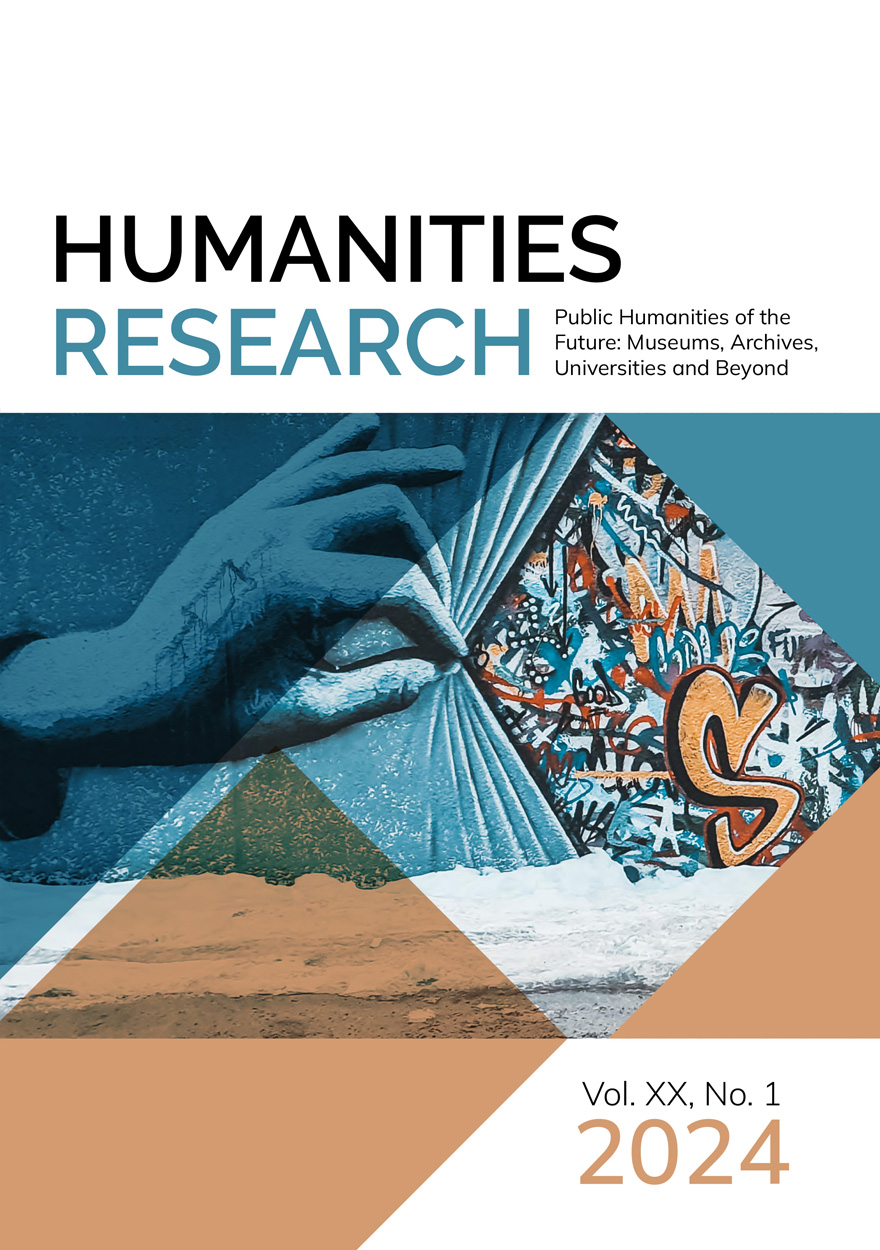
Humanities Research: Volume XX, Number 1, 2024 »
Public Humanities of the Future: Museums, Archives, Universities and Beyond
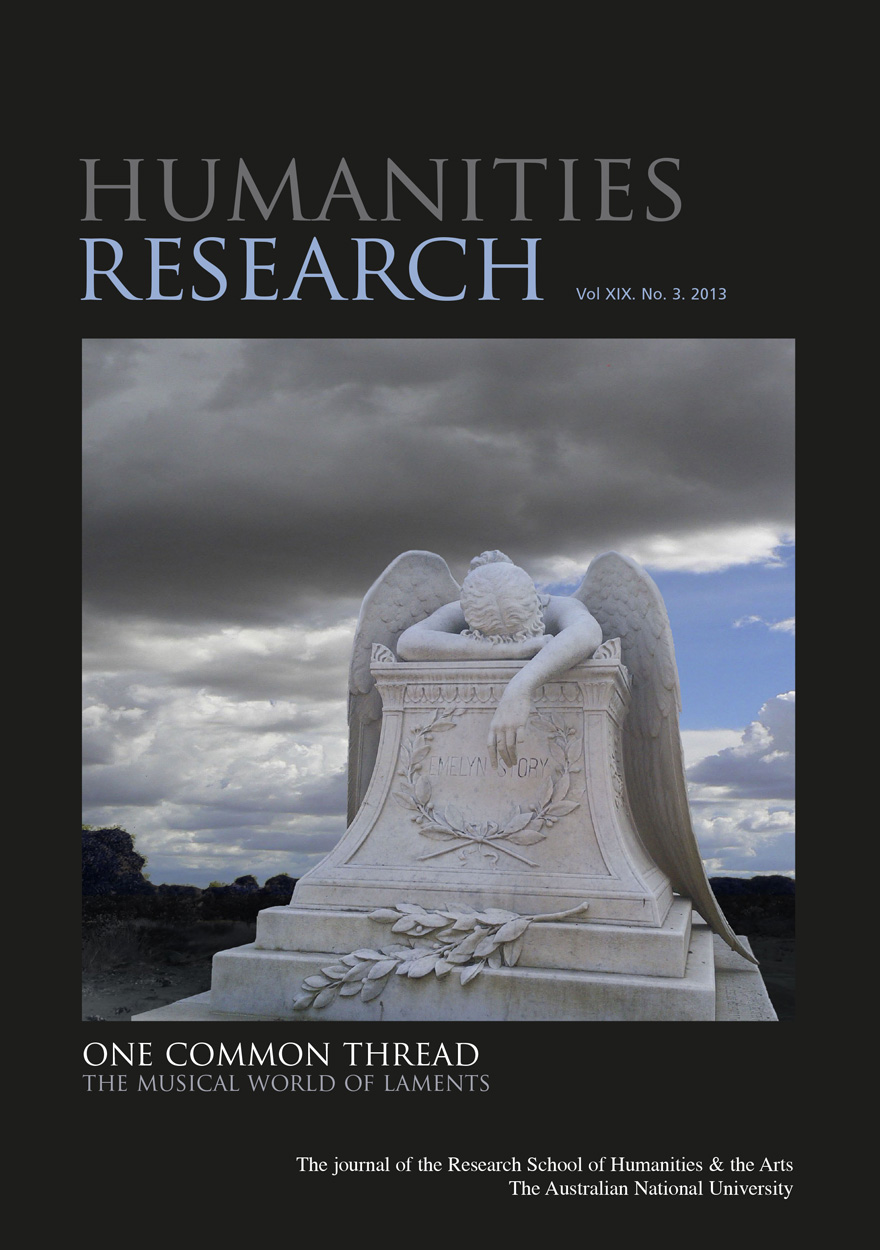
Humanities Research: Volume XIX No. 3. 2013 »
One Common Thread: The Musical World of Lament
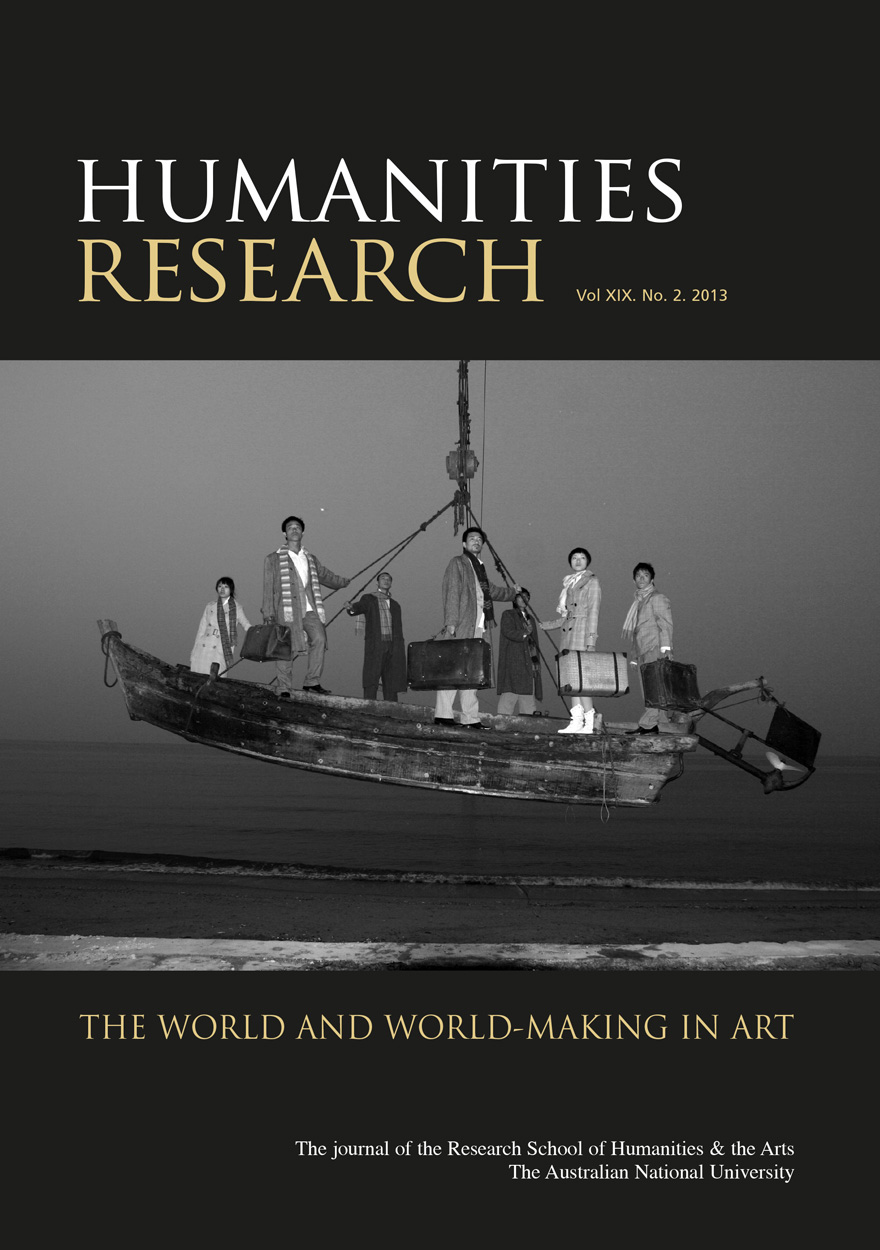
Humanities Research: Volume XIX No. 2. 2013 »
The World and World-Making in Art
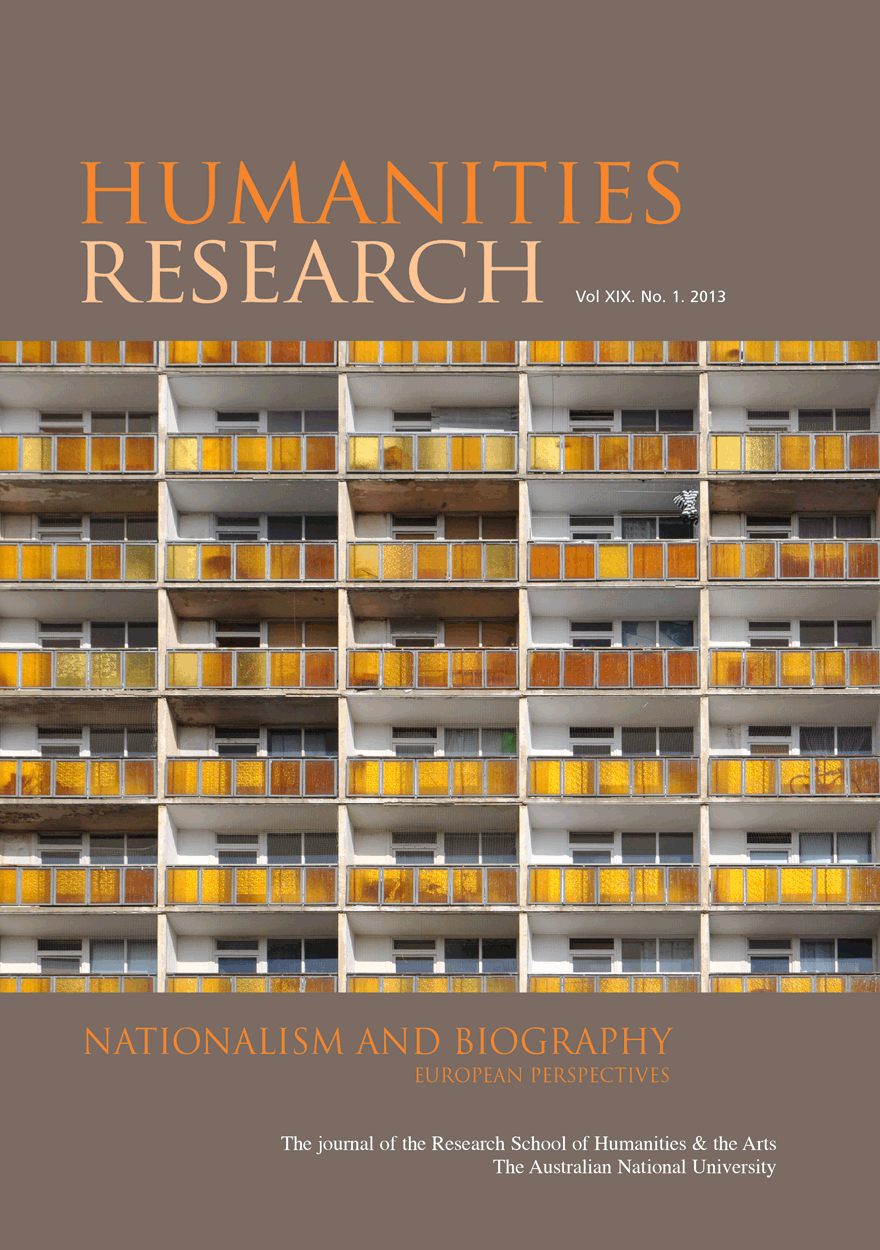
Humanities Research: Volume XIX No. 1. 2013 »
Nationalism and Biography: European Perspectives
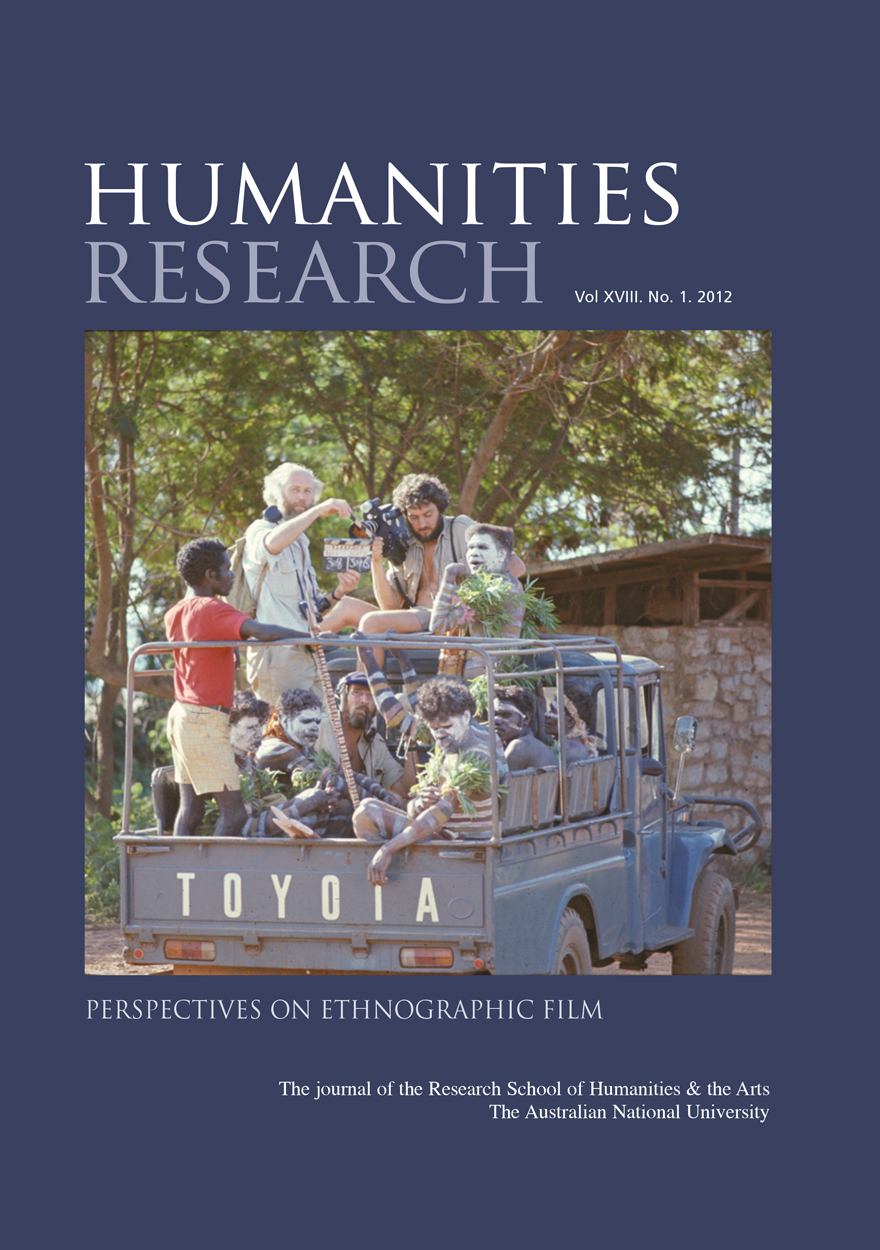
Humanities Research: Volume XVIII. No. 1. 2012 »
Perspectives on Ethnographic Film
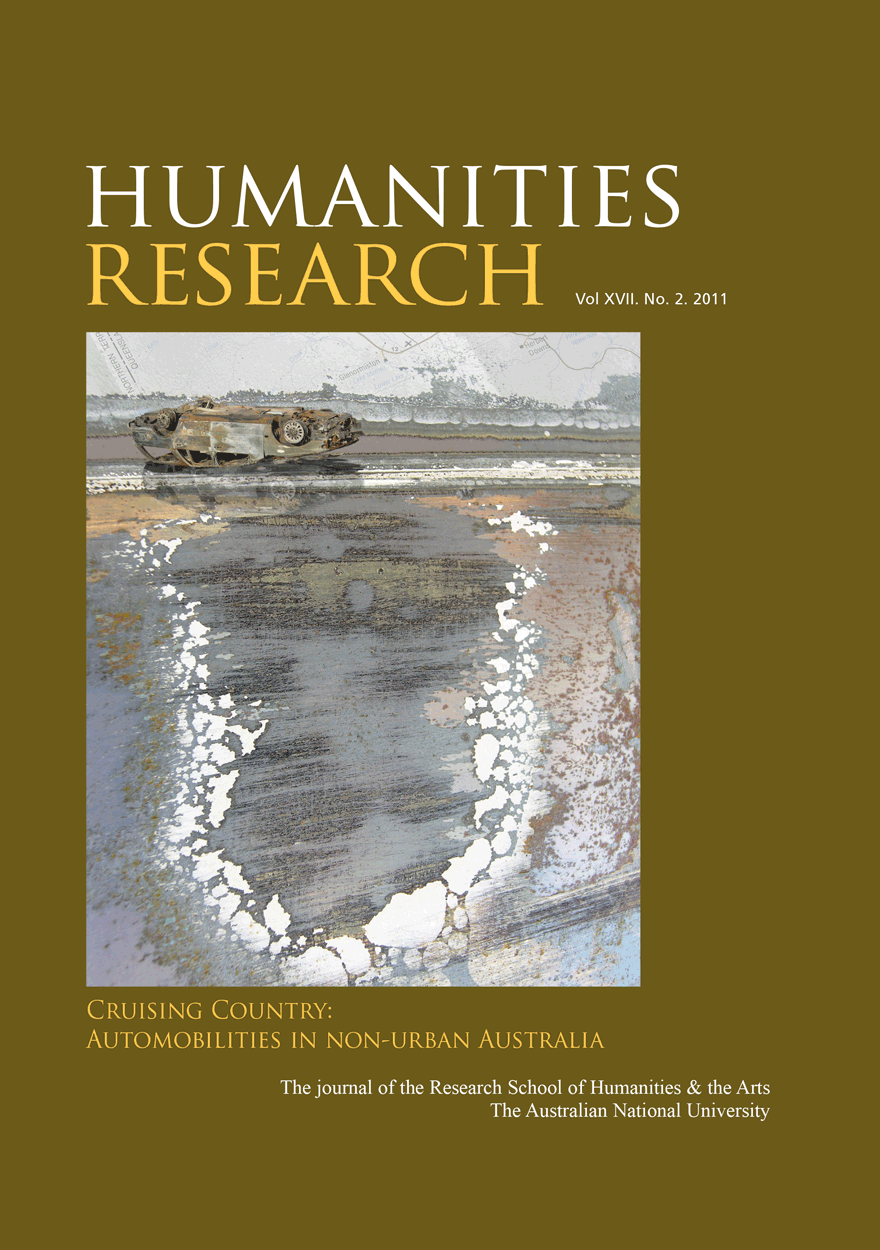
Humanities Research: Volume XVII. No. 2. 2011 »
Cruising Country: Automobilities in non-urban Australia
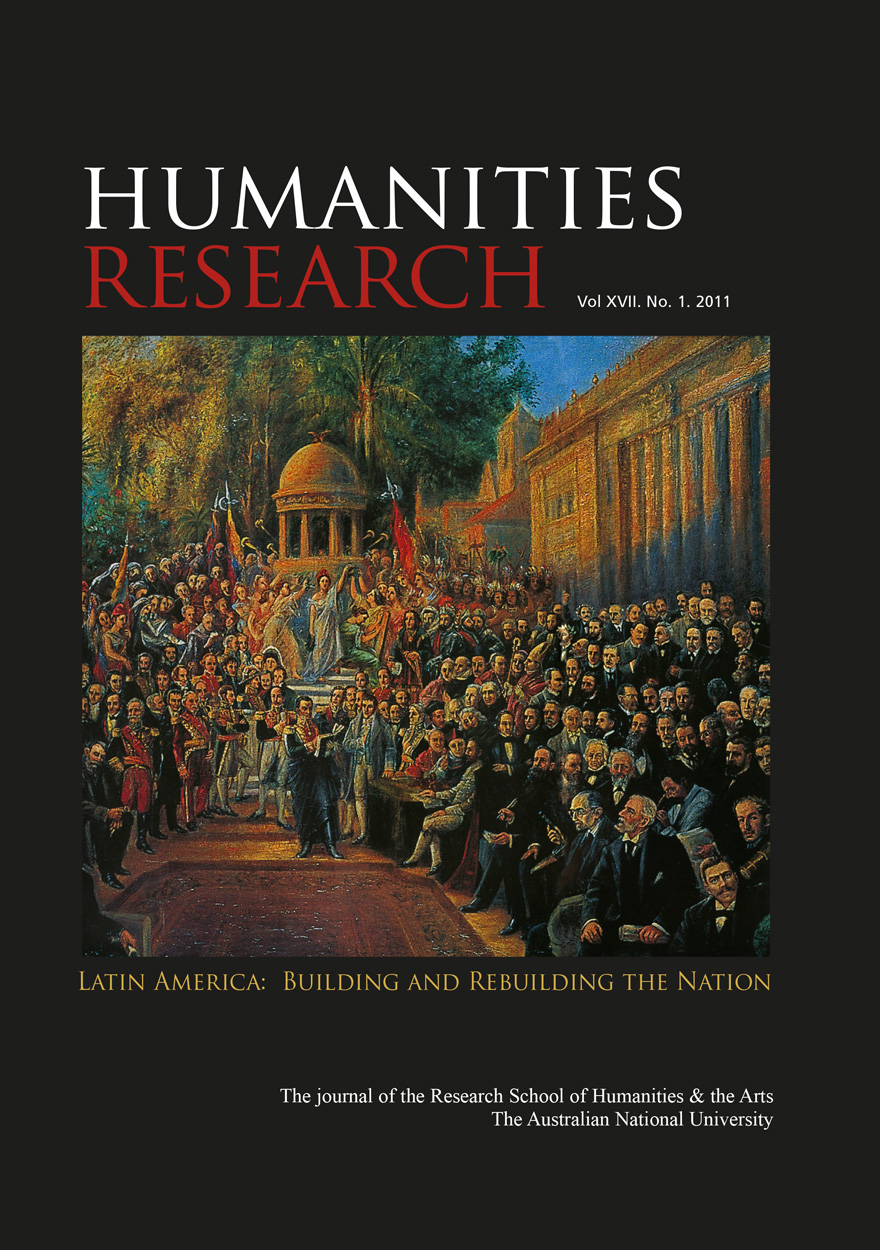
Humanities Research: Volume XVII. No. 1. 2011 »
Latin America: Building and Rebuilding the Nation
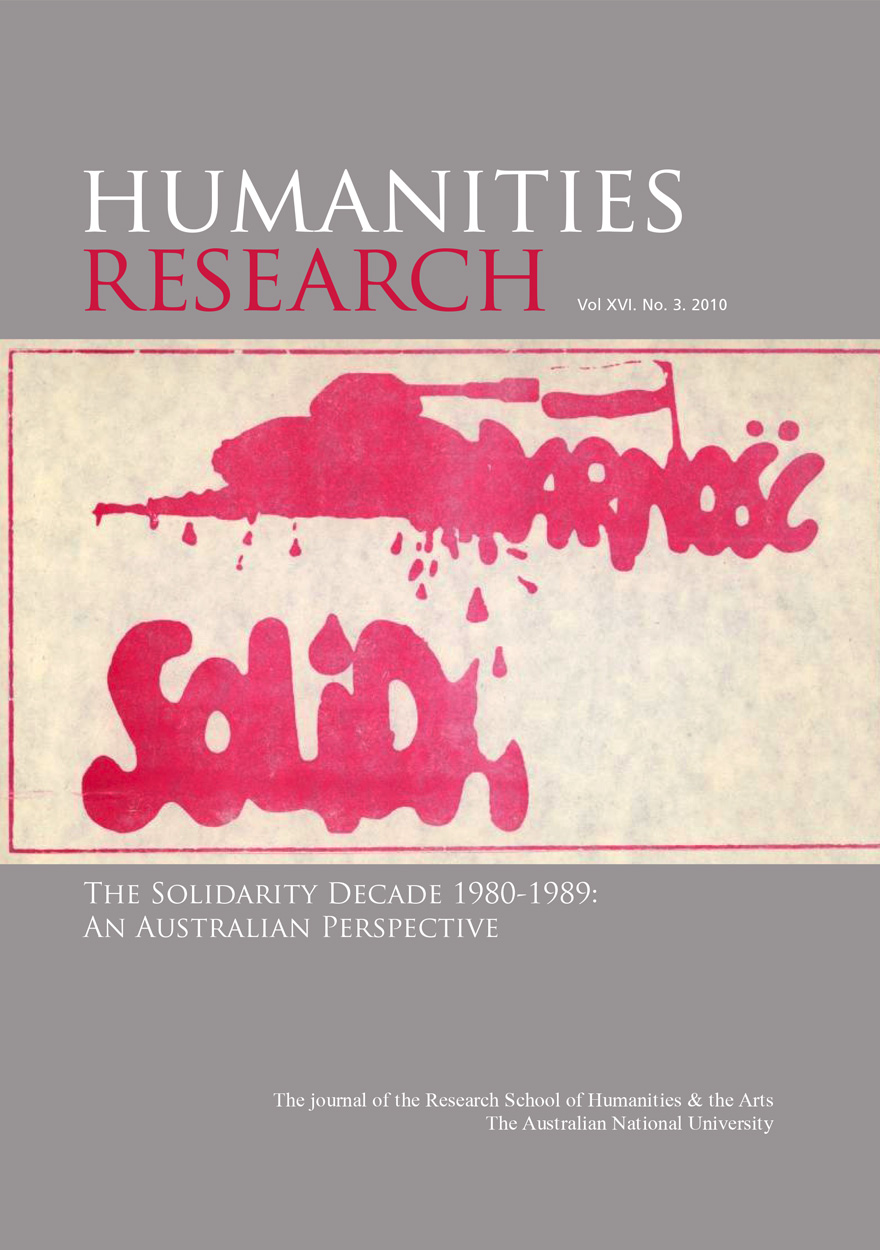
Humanities Research: Volume XVI. No. 3. 2010 »
The Solidarity Decade 1980-1989: An Australian Perspective
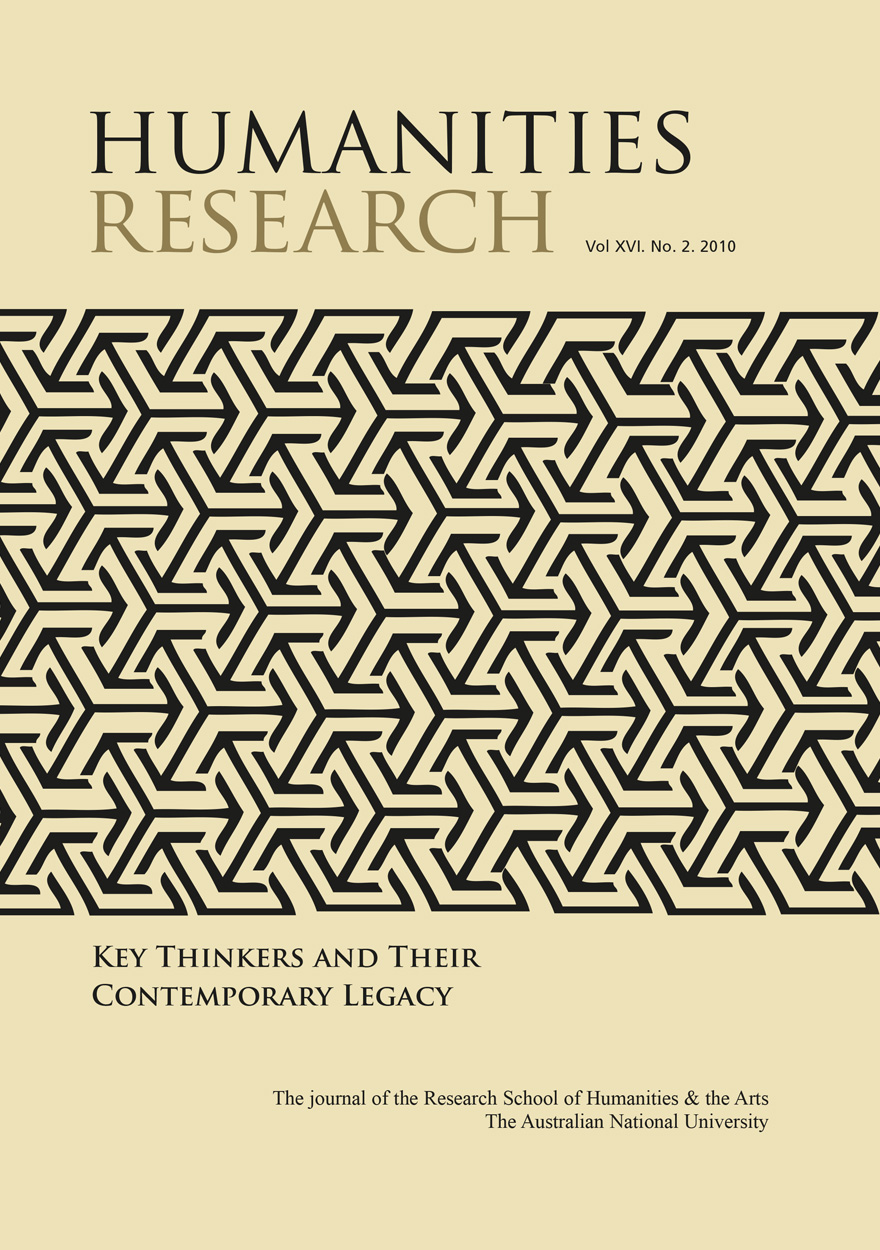
Humanities Research: Volume XVI. No. 2. 2010 »
Key Thinkers and Their Contemporary Legacy
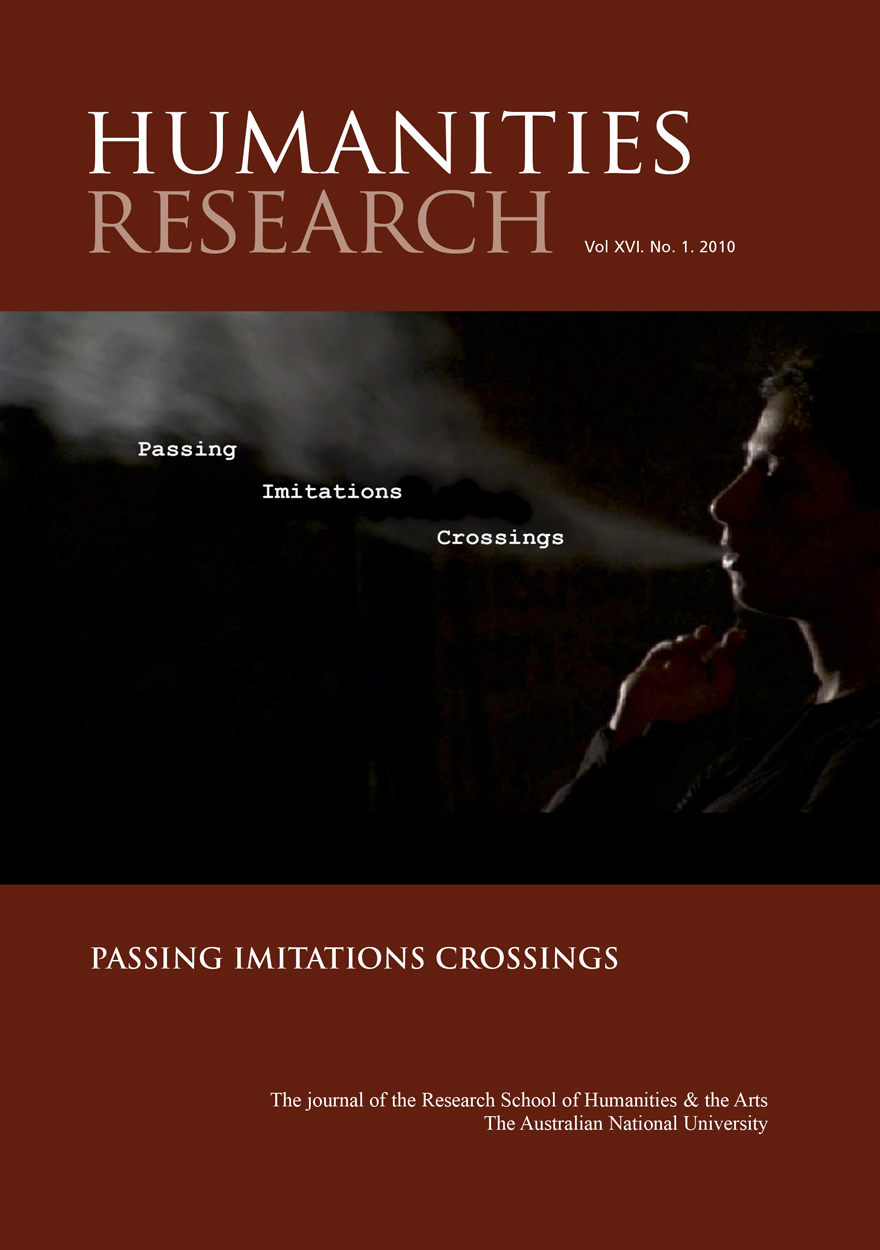
Humanities Research: Volume XVI. No. 1. 2010 »
Passing, Imitations, Crossings
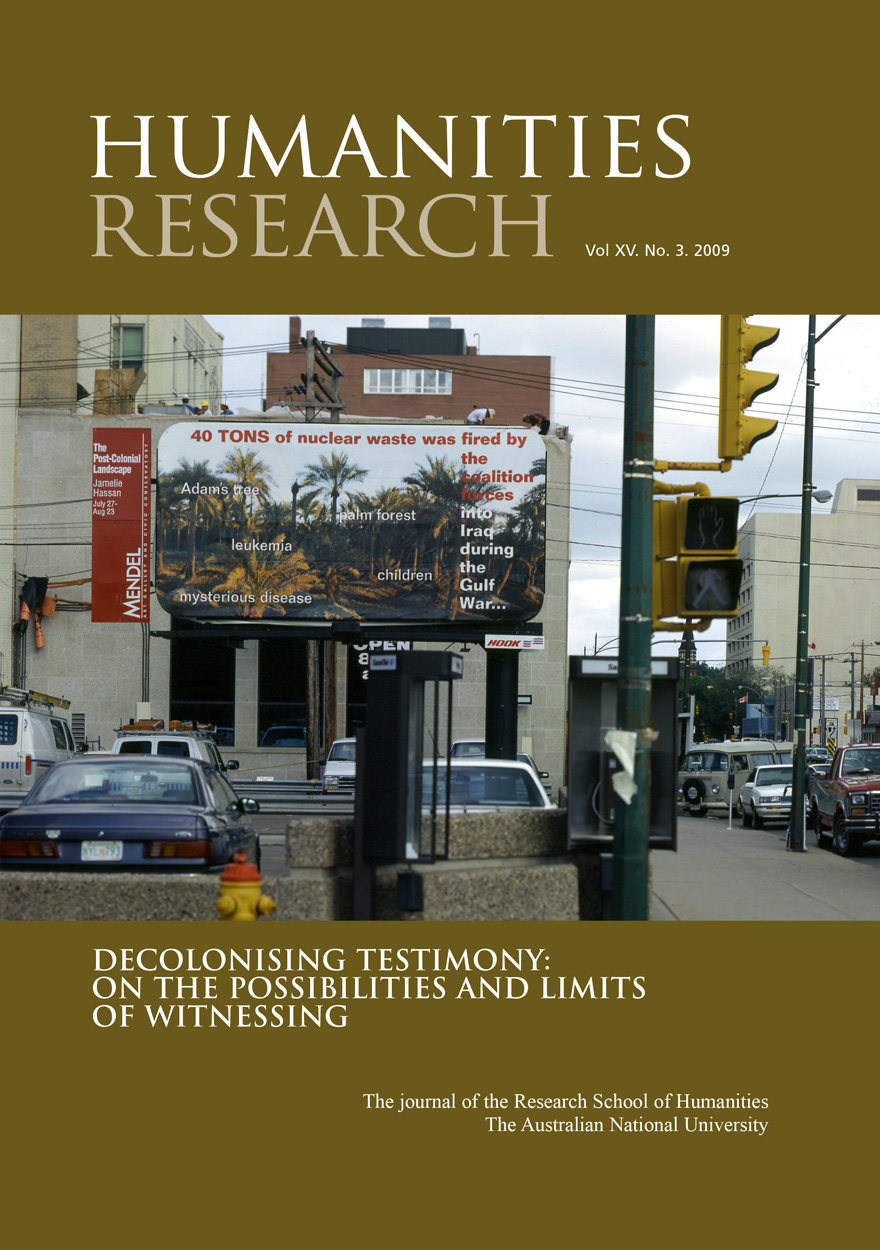
Humanities Research: Volume XV. No. 3. 2009 »
Decolonising Testimony: On the possibilities and limits of witnessing
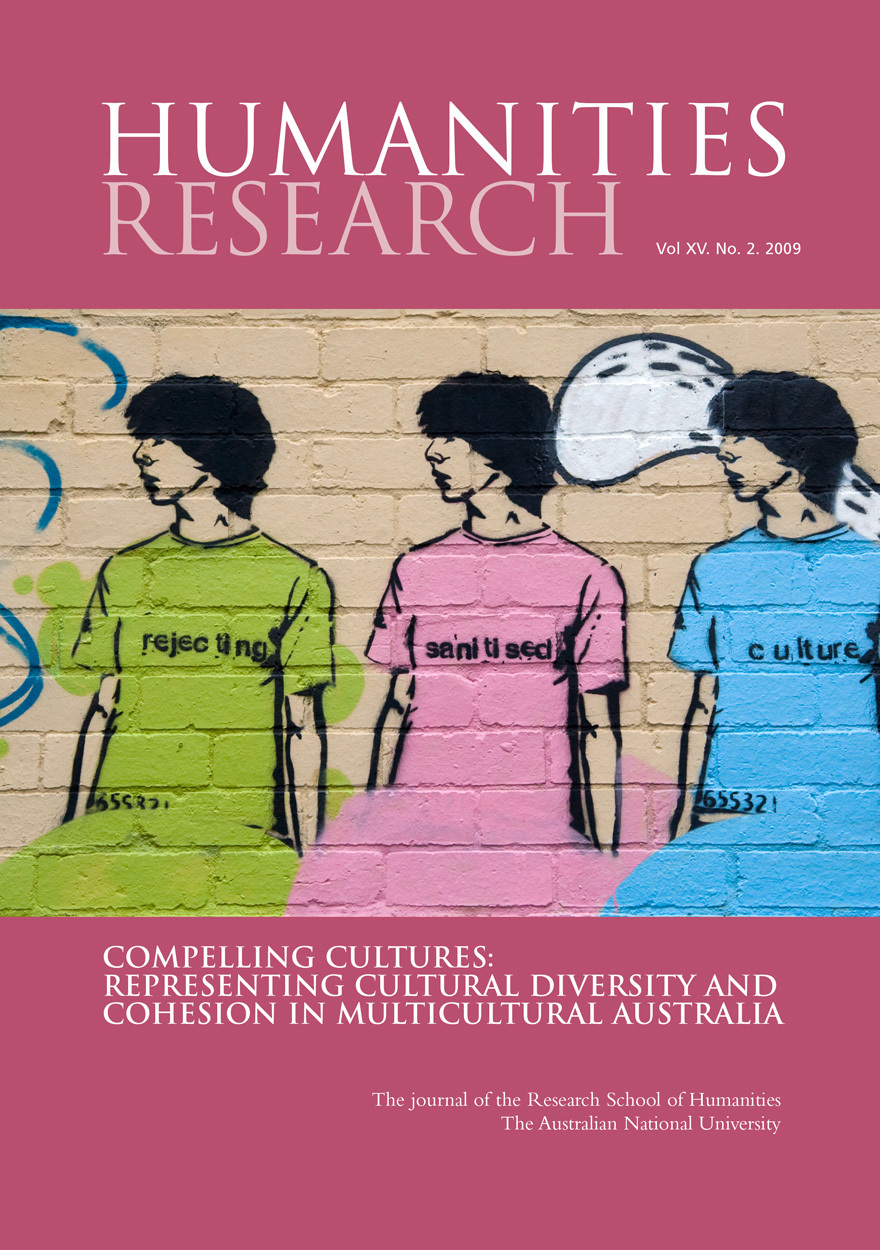
Humanities Research: Volume XV. No. 2. 2009 »
Compelling Cultures: Representing Cultural Diversity and Cohesion in Multicultural Australia
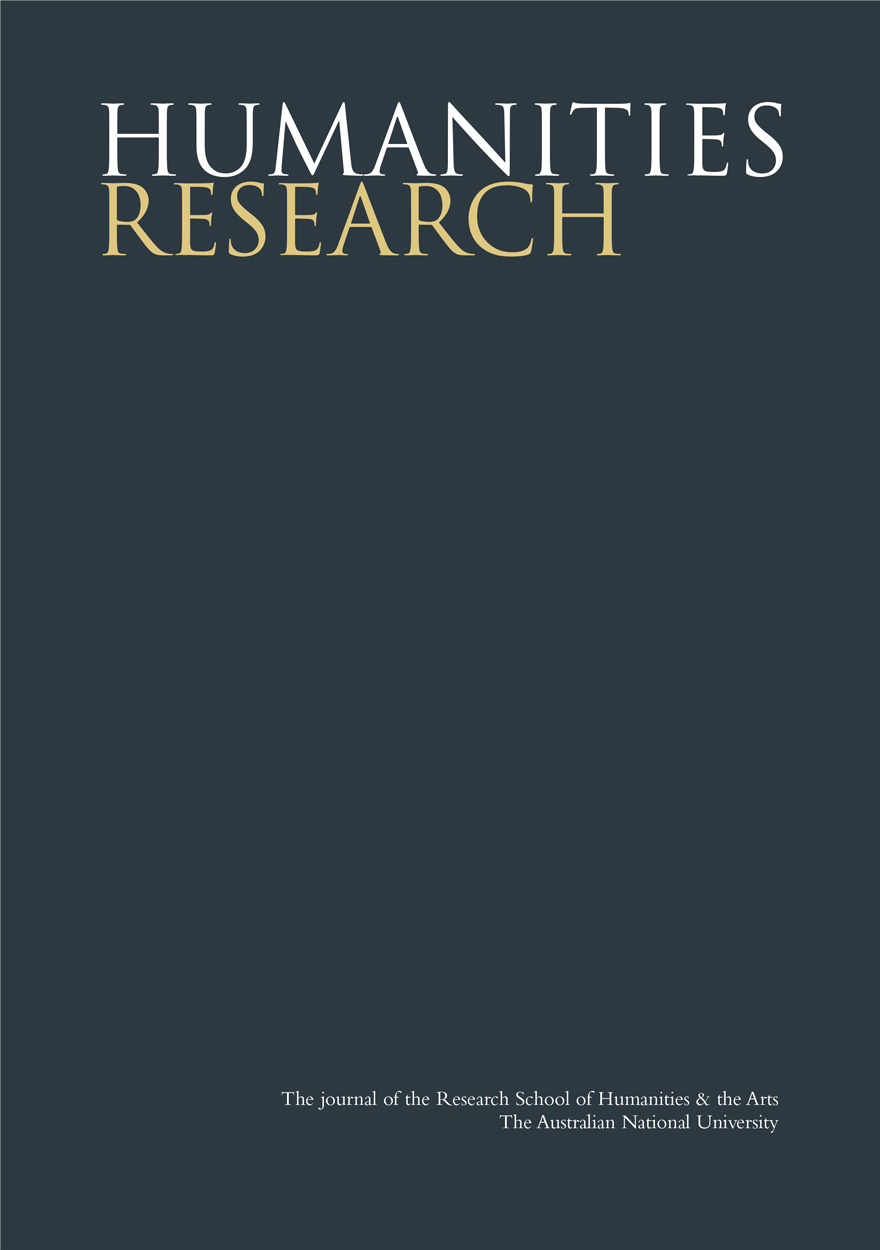
Humanities Research Journal Series: No. 1. 2000 »
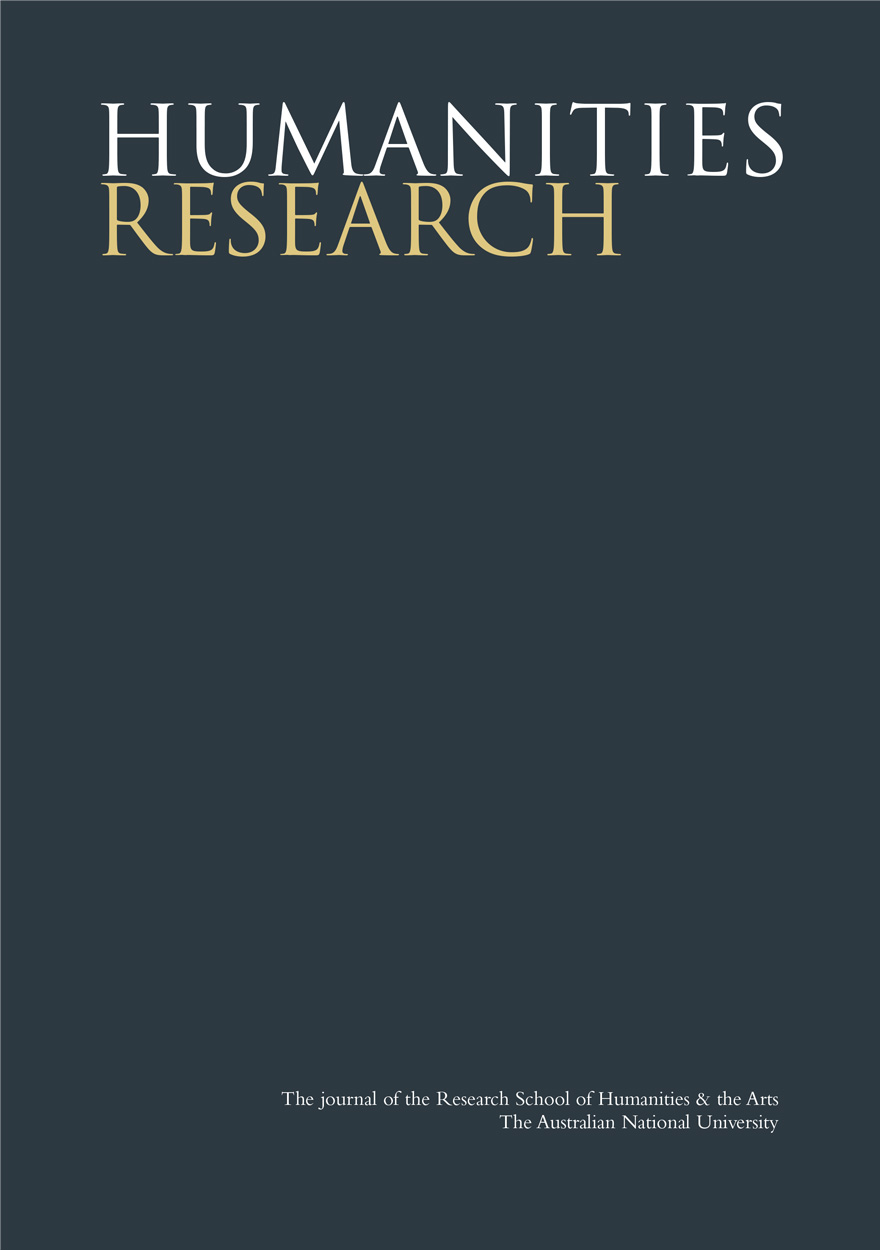
Humanities Research: No. 2. 1999 »
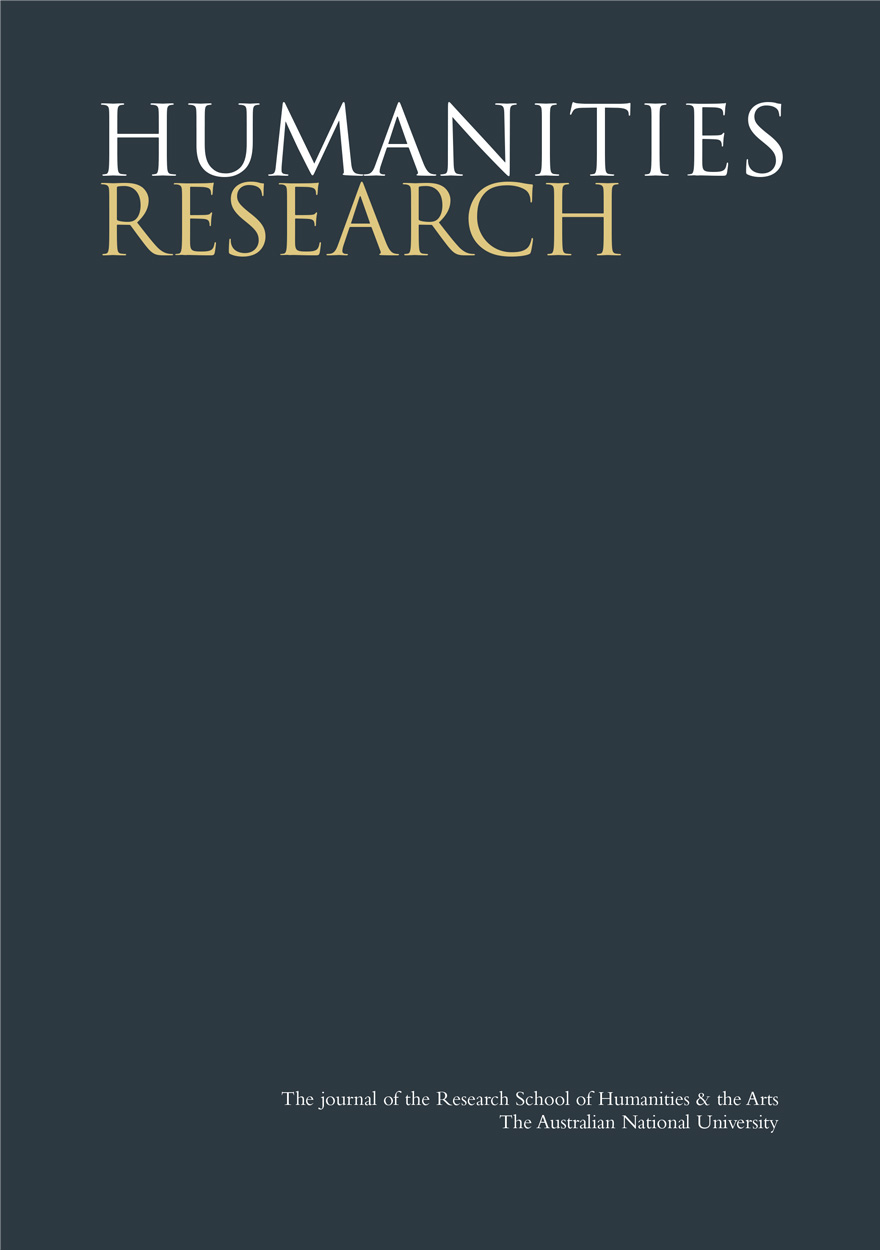
Humanities Research: No. 1. 1999 »
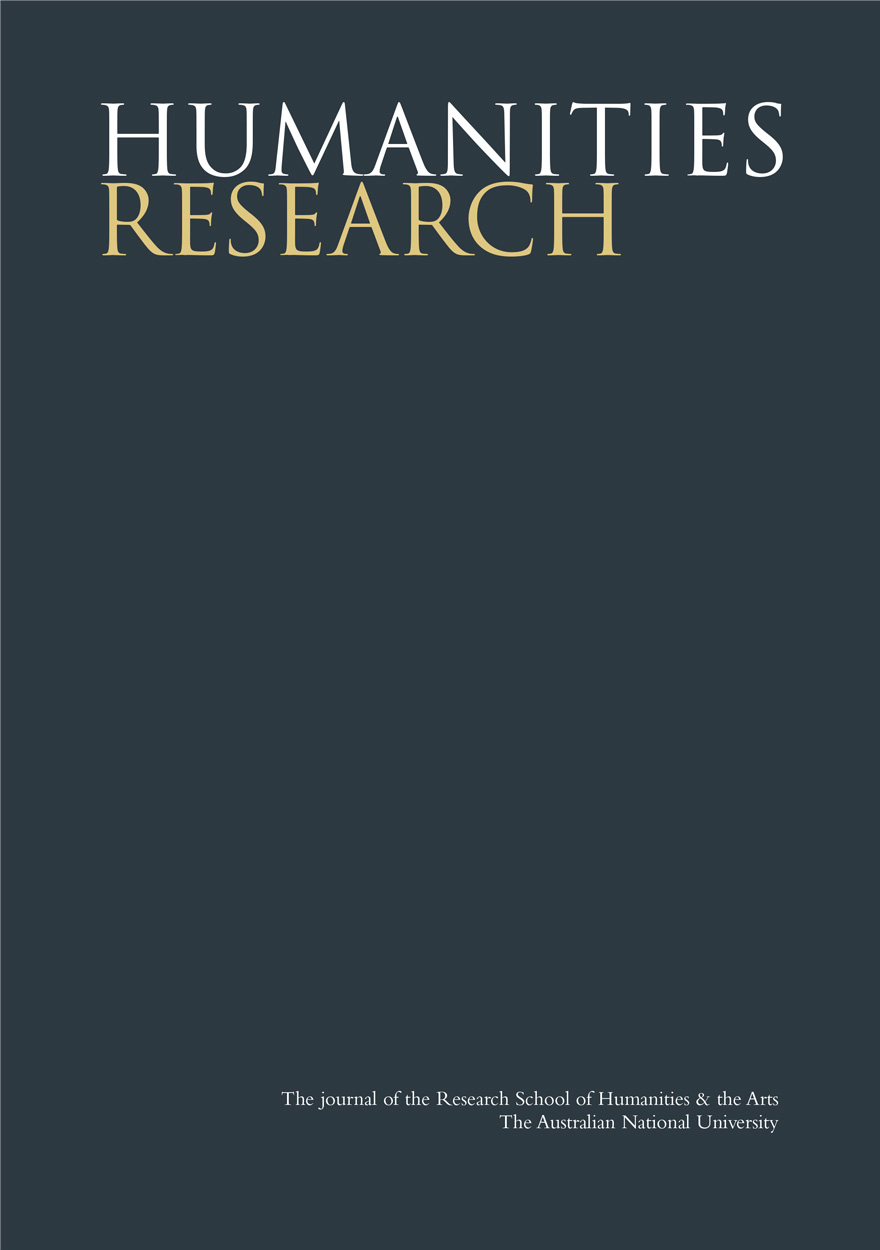
Humanities Research: No. 3. 1998 »
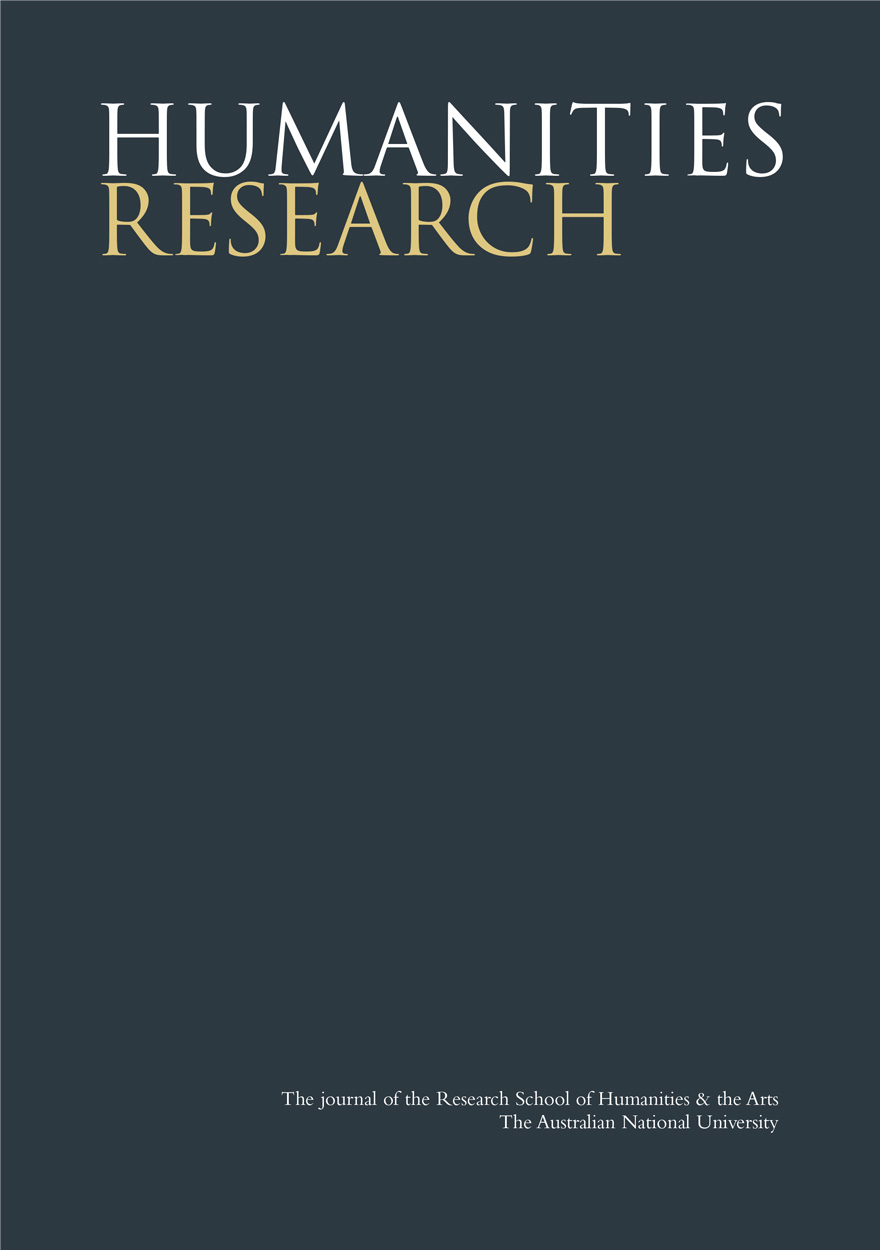
Humanities Research: No. 2. 1998 »
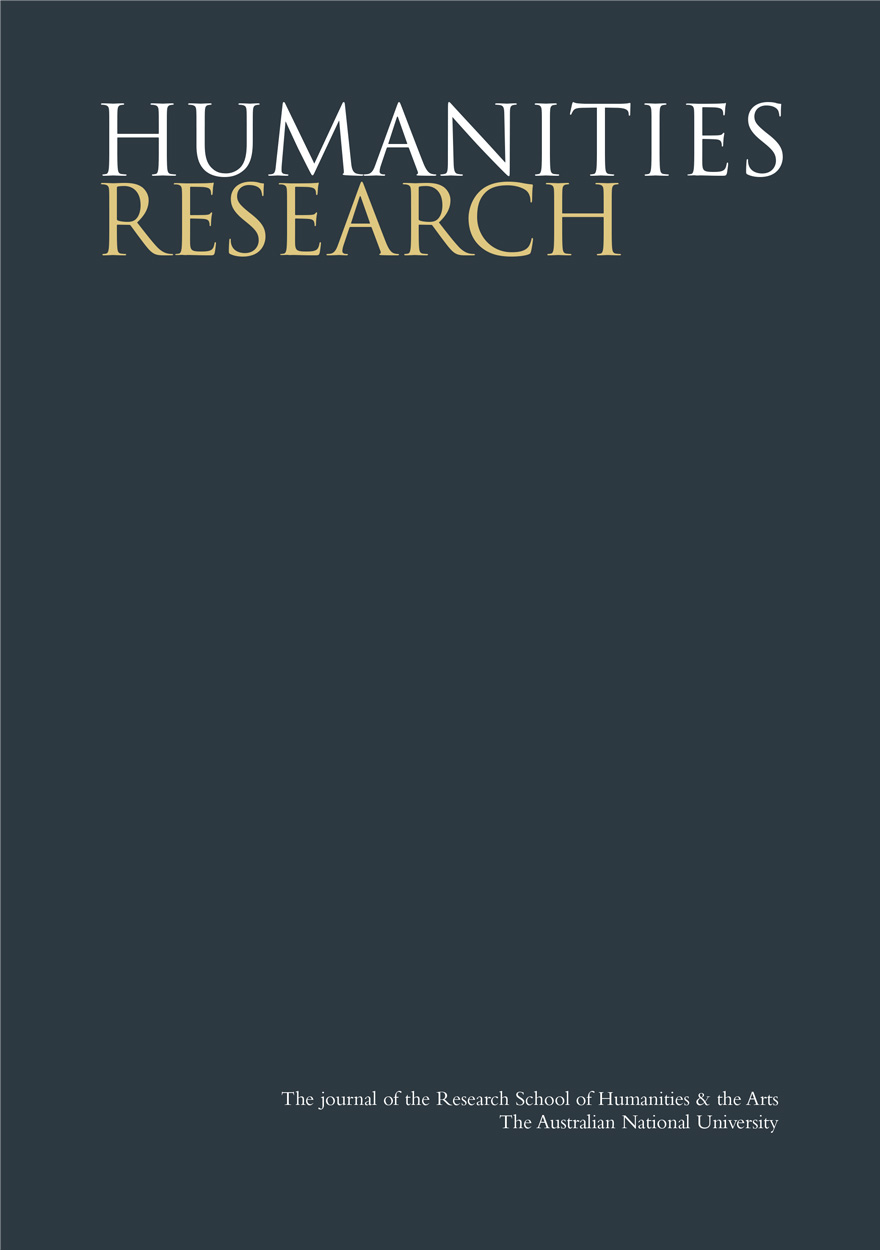
Humanities Research: No. 1. 1998 »
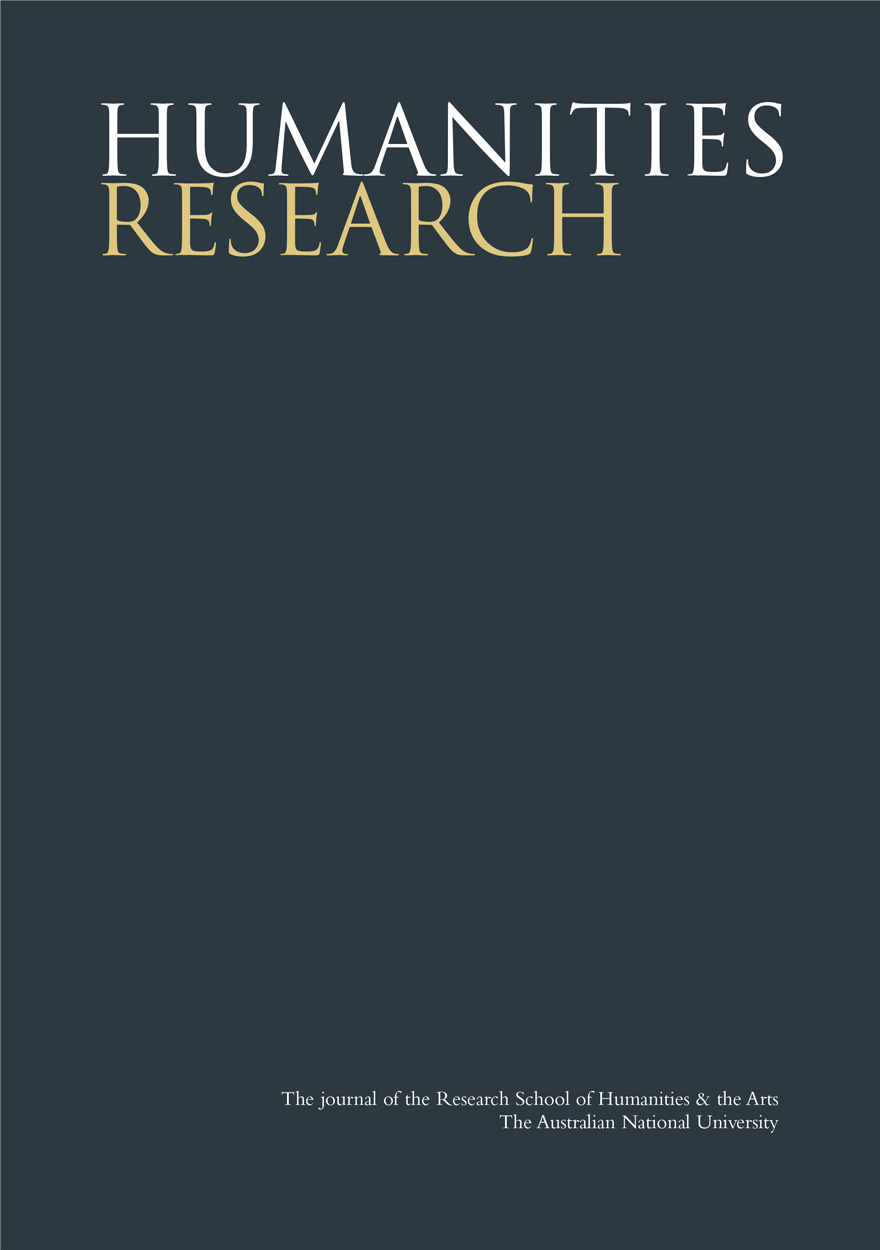
Humanities Research: Winter 1997 »
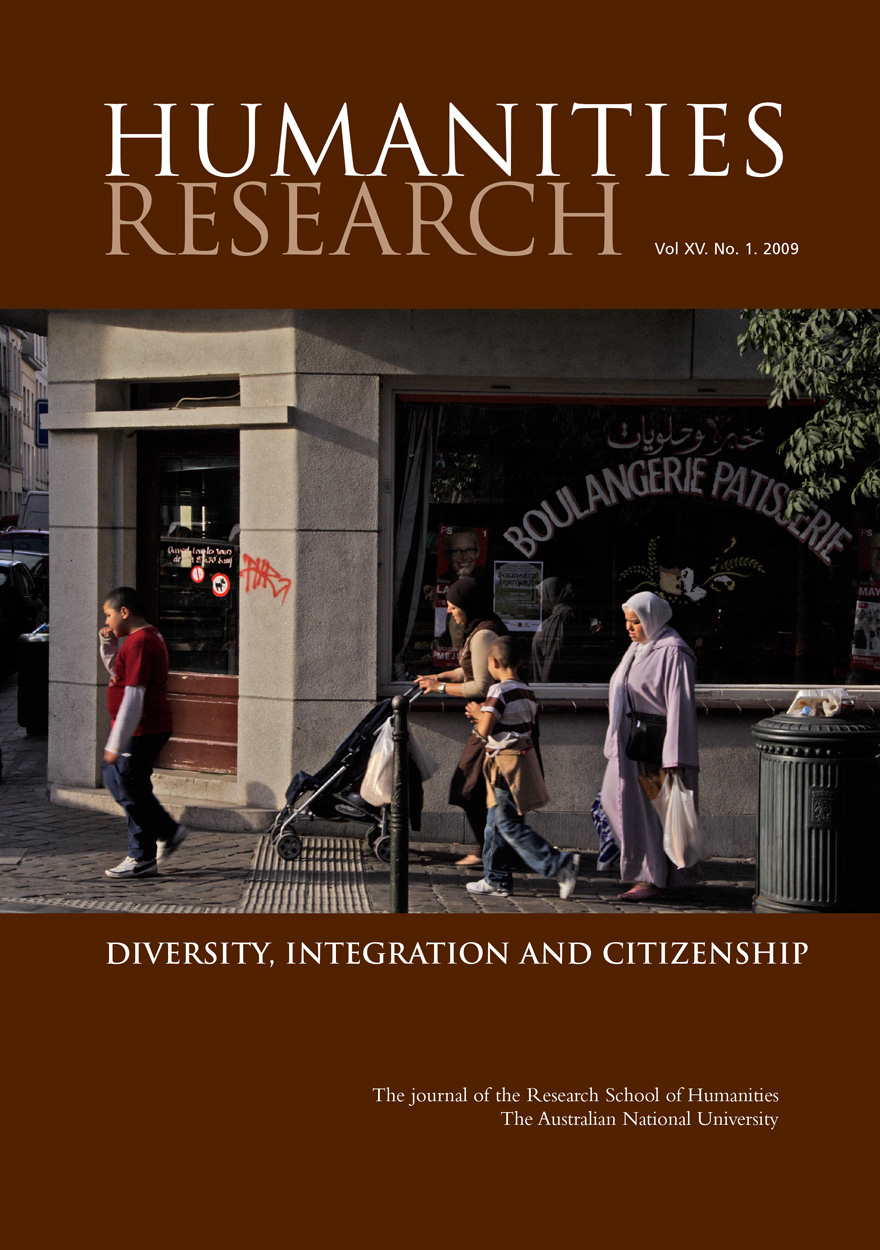
Humanities Research: Volume XV. No. 1. 2009 »
Diversity, Integration and Citizenship
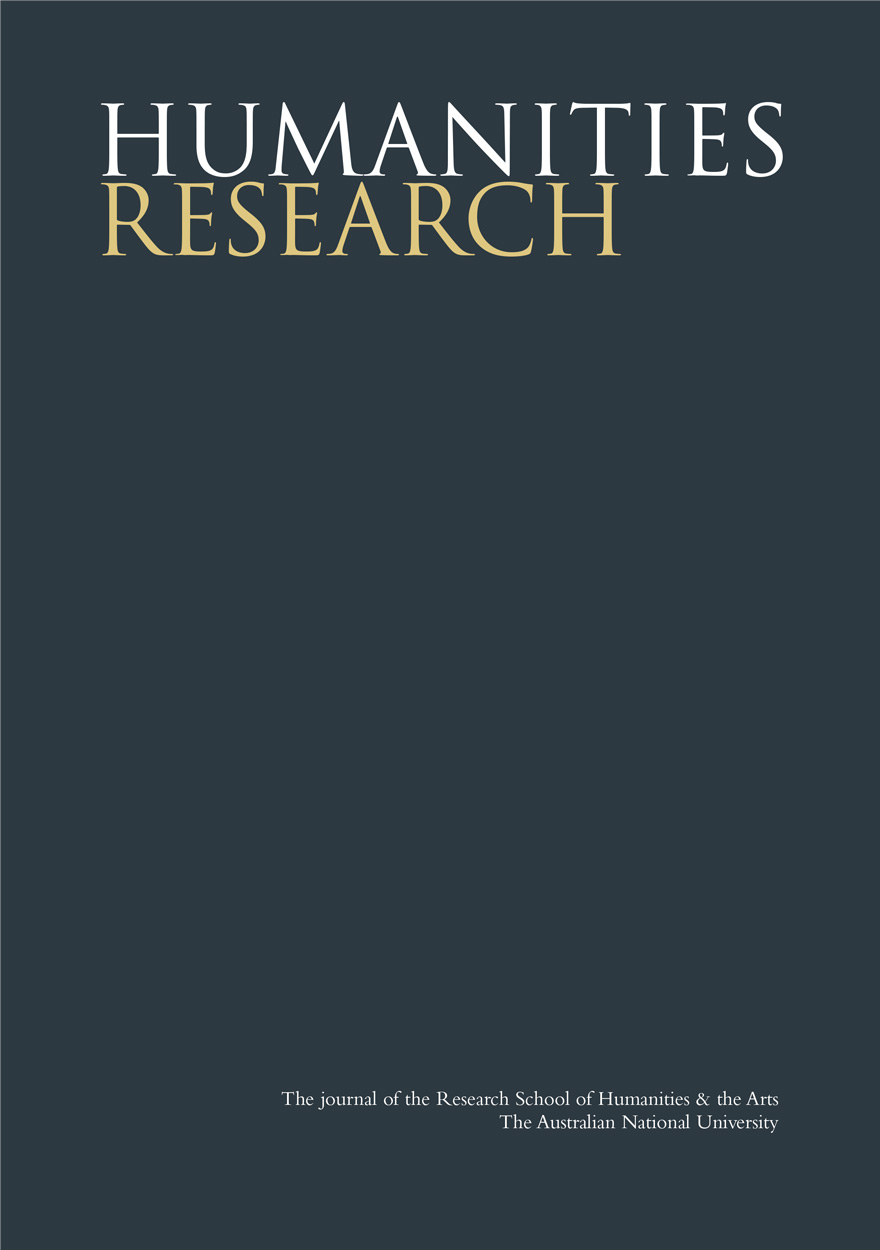
Humanities Research Journal Series: Volume IX. No. 1. 2002 »
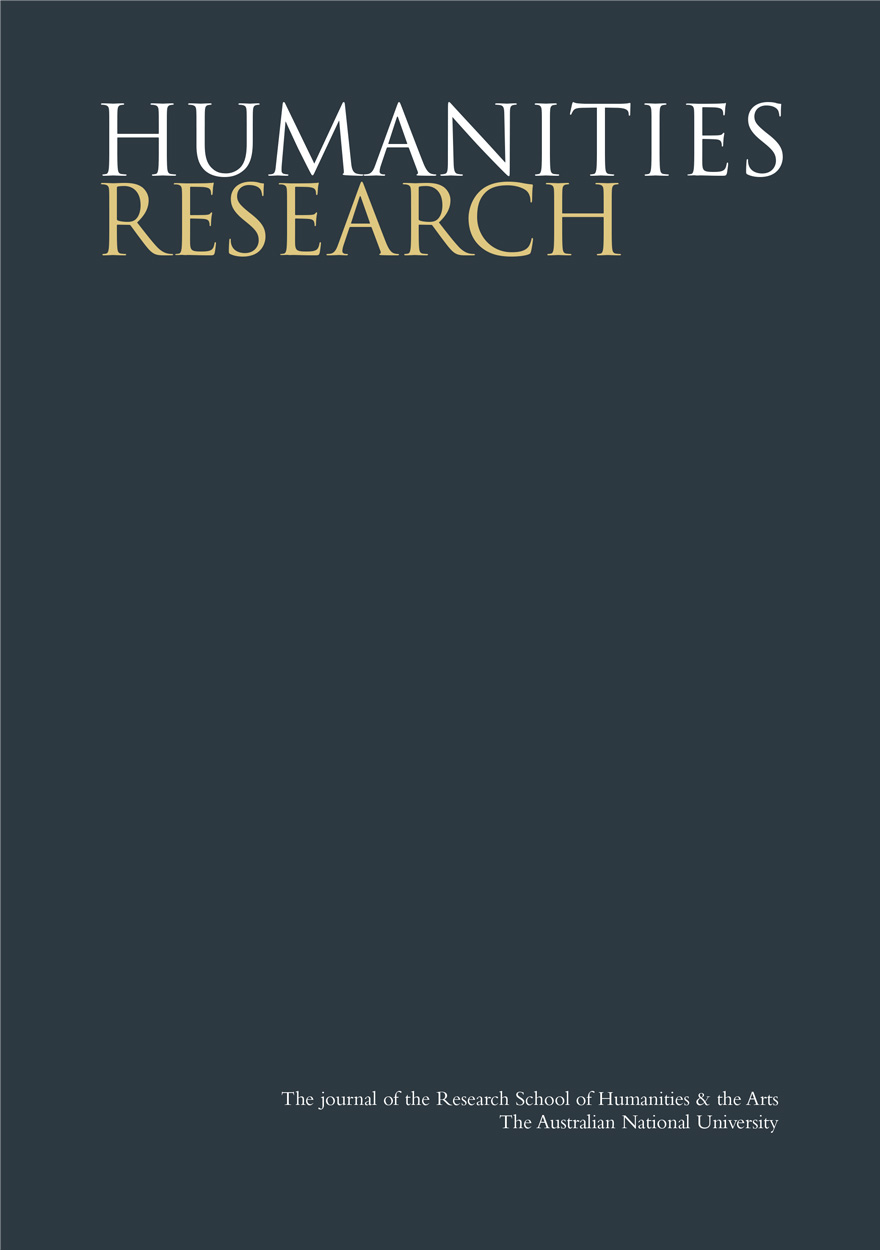
Humanities Research Journal Series: Volume VIII. No. 1. 2001 »
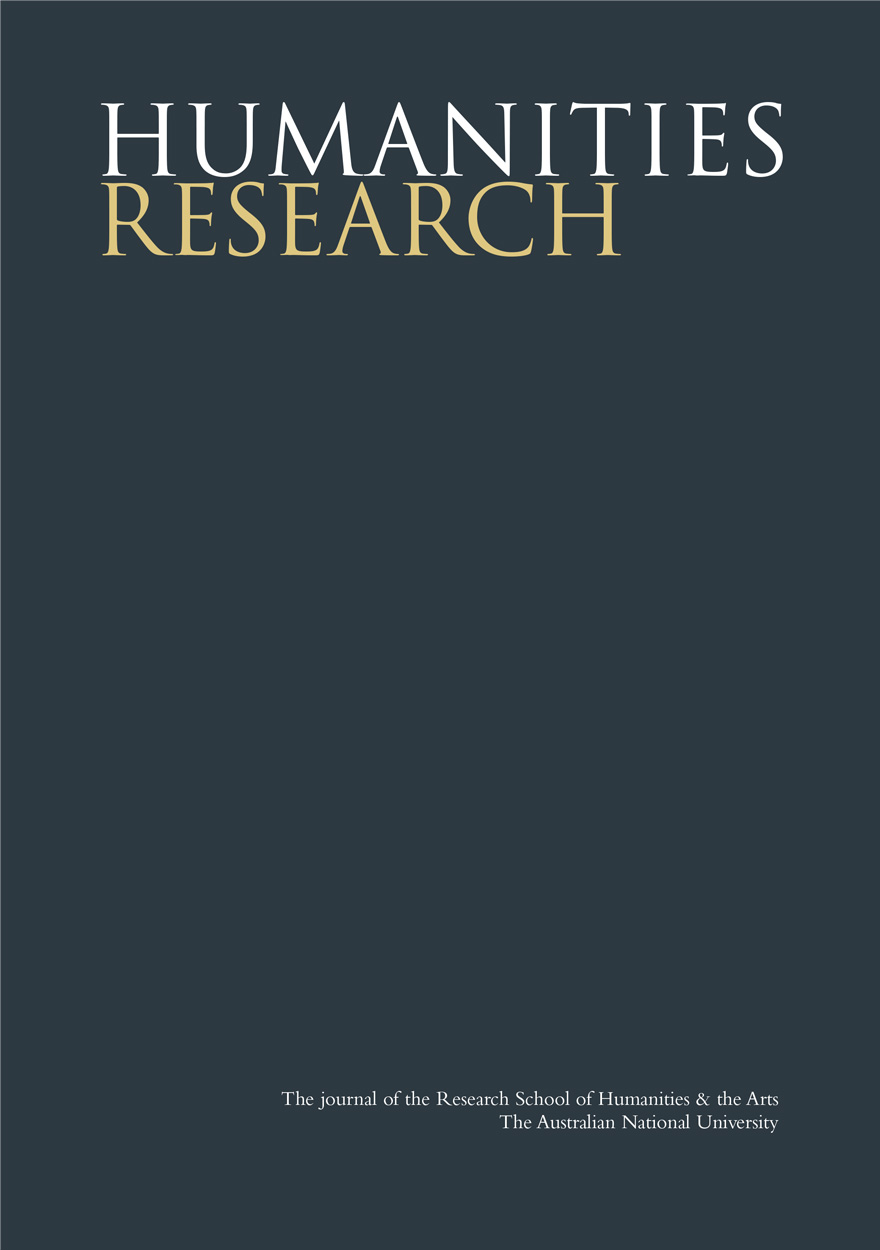
Humanities Research: Volume XI. No. 1. 2004 »
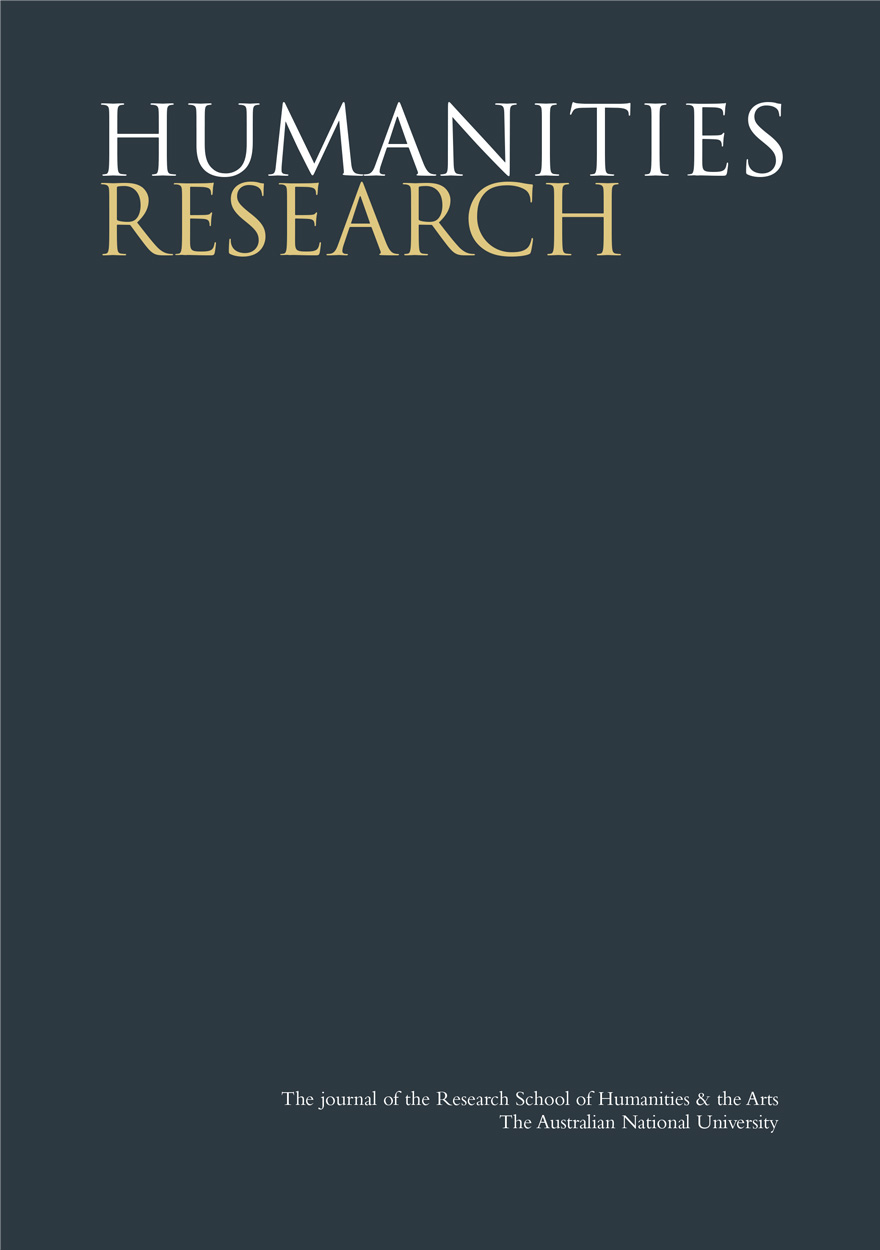
Humanities Research: Volume X. No. 1. 2003 »
